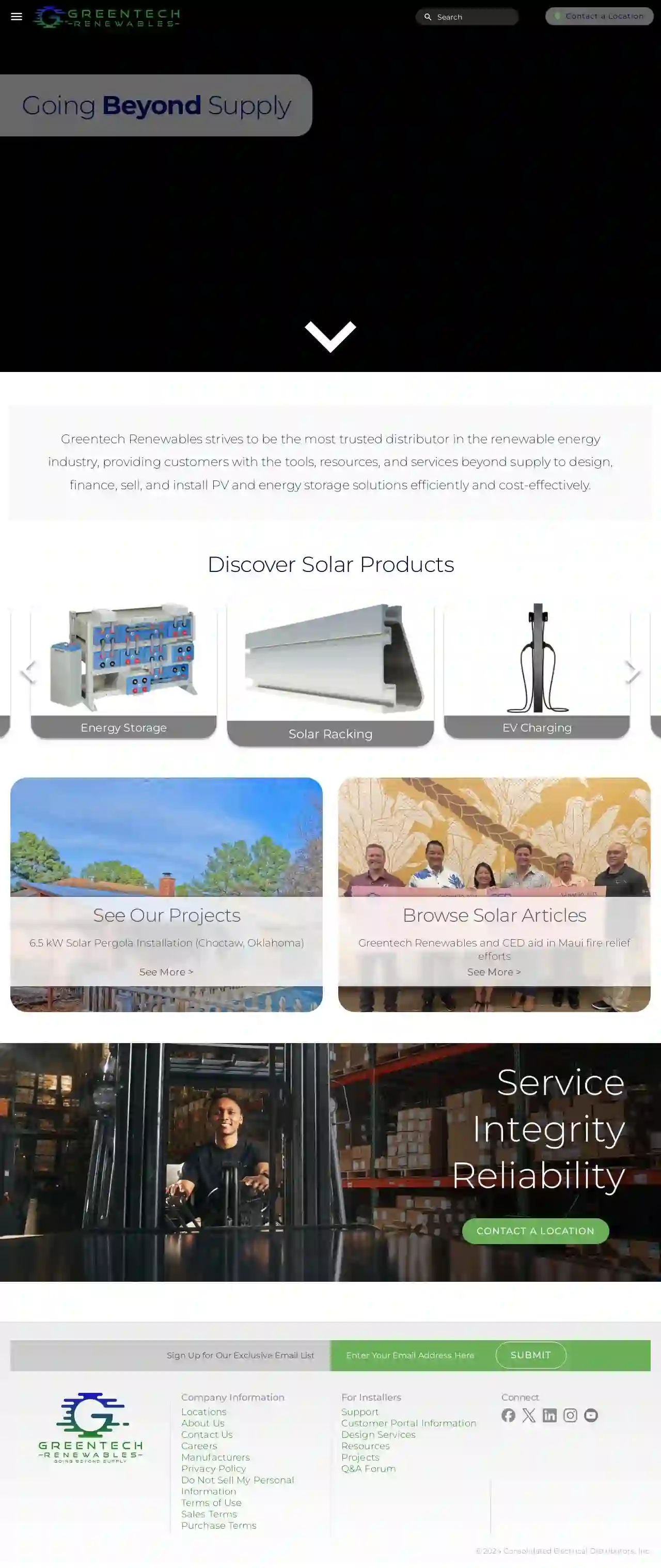Solar Installers Sutton in Ashfield
Best Solar Contractors in Sutton in Ashfield
Receive 3 FREE Solar Contractors quotes for your project today! Compare profiles, reviews, accreditations, portfolio, etc... and choose the best offer.

Get Solar PV
Cleethorpes, England, 36 High Street, DN35 8JN, GBGet Solar PV is a company that helps homeowners and businesses switch to solar energy. They provide a quote tool that determines the customer's requirements and connects them with trusted suppliers. The company ensures that all installers are fully compliant with UK legislation and best practice industry procedures. They also offer flexible payment plans and finance facilities. Get Solar PV is a responsible agent that prioritizes the environment and customer satisfaction.
- Services
- Why Us?
- Accreditations
- Our Team
- Testimonials
- Gallery
Get Quote
Danlec Solar & EV Chargers
4.9374 reviewsUnit 4, Shireoaks Network Centre, Coach Crescent, Worksop, S81 8AD, GBProviding homes and businesses with Energy Saving Electrical, EV Charging and Solar Energy Systems. Our NICEIC Approved team of qualified electricians are here to provide professional and courteous services from a consumer unit upgrade to a full factory re-fit. We are ready to help you upgrade, refurbish, or repair any electrical issue in your home or business. With our specialist EV charging installers and technical support team, we are on hand to help you choose the perfect EV charger for your home or business. Our 5 Year Workmanship Guarantee and Trustmark Certification are both included with every installation for your total peace of mind. Choose from our bespoke range of solar panels to reduce your energy bills and carbon footprint.
- Services
- Why Us?
- Accreditations
- Testimonials
- Gallery
Get Quote
Great British Solar
Mansfield, GBComing Soon New WordPress website is being built and will be published soon
- Services
- Why Us?
- Gallery
Get Quote
PowerPoint Ltd
53 reviewsWorksop, GBWelcome to PowerPoint Ltd, delivering high quality services to domestic, commercial and industrial customers. With over 20 years in the electrical and renewable energy sectors, we pride ourselves in delivering reliable electrical services in the Yorkshire, Derbyshire, Leicestershire, Lincolnshire and Nottinghamshire areas. We are also available to offer our services to business customers throughout the UK. Our fully trained engineers have extensive experience in PV solar installers, EV charger installers, and voltage optimisation. We have a proven track record of delivering high-quality services to our clients, as evident from our testimonials.
- Services
- Why Us?
- Testimonials
- Gallery
Get Quote
Solar Save Ltd
53 reviewsRetford Enterprise Centre, Randall Way, DN22 7GR, GBAt SolarSave Ltd, we're here to assist with all your solar needs and questions. Connect with our dedicated team today! We install the highest quality solar panels, who are we? Pioneers in Solar Solutions. At SolarSave Ltd, our goal is simple: to provide homeowners and businesses with high-quality solar installations that last for decades. Our experienced team of professionals is committed to ensuring every project is executed to perfection. Renowned Installation Expertise. Trustworthy & Experienced Leadership. Passionate & Dedicated Support Team. Unmatched Installation Precision. 100% Client Satisfaction Guarantee. Eco-Friendly Solutions for a Greener Planet.
- Services
- Why Us?
- Our Team
- Gallery
Get Quote
GB Solar Ltd
559 reviewsUnit 6 Coach Crescent, Shireoaks Network Centre, Worksop, S81 8AD, GBGB Solar is a company that specializes in the installation of domestic and commercial solar panels, including retrofit storage batteries. They serve customers in Yorkshire and the East Midlands, covering areas like Sheffield, Leeds, Nottingham, and surrounding regions. GB Solar prides itself on providing exceptional workmanship and customer care, aiming to help customers save money and reduce their carbon footprint. They emphasize their commitment to customer satisfaction, highlighting positive feedback and five-star reviews on Google.
- Services
- Why Us?
- Gallery
Get Quote
Green Energy Power Solutions
2.133 reviewsWorksop, GBEstablished since 2009, Green Energy Power Solutions are dedicated to sustainable energy and have been effectively helping customers to lower their carbon footprint by switching to renewable energy. With the ever-increasing energy rises, there is no better time than to consider installing solar energy to your home. Our Services Installation - Solar PV System. Prices from £2995 Annual Service Plan £179 Maintenance Visit £125 GET IN TOUCH [email protected] 01909500555
- Services
- Why Us?
- Gallery
Get Quote
Greentech Renewables Mansfield
Mansfield, GBGreentech Renewables strives to be the most trusted distributor in the renewable energy industry, providing customers with the tools, resources, and services beyond supply to design, finance, sell, and install PV and energy storage solutions efficiently and cost-effectively. We remain a part of Consolidated Electrical Distributors, Inc., affording us the same scale and stability in servicing the nation’s solar contractors with a history of success in distribution since 1957. We are local nationwide, with over 100 locations in major solar markets in the US. Our Greentech Renewables warehouses offer extensive on-site inventory and logistics support in addition to our financing, design, and residential and commercial services.
- Services
- Why Us?
- Gallery
Get Quote
Cannon Solar
55 reviewsWorksop, GBCannon Solar, the foremost MCS accredited solar panel contractor in the UK, takes pride in delivering professional and high-quality services. Whether you're a homeowner, estate agent, business owner, local authority, or home builder, our expertise spans domestic, commercial, and industrial solar electric installations. With a focus on renewable energy, we specialise in the seamless integration of Solar Panels. Our clients value our professionalism, extensive experience, high quality, and cost-effective solutions.
- Services
- Why Us?
- Gallery
Get Quote
Renewafuel Home Innovations
4.735 reviewsWorksop, GBRenewafuel is a leading provider of renewable energy solutions, helping homeowners and businesses transition to a cleaner, greener future. We offer a wide range of services, including solar panel installation, battery storage, air source heat pumps, and EV charging. Our team of expert engineers is dedicated to providing high-quality, reliable solutions tailored to your individual needs. We are committed to delivering exceptional customer service and ensuring your complete satisfaction. With our expertise and commitment to sustainability, Renewafuel is your trusted partner for all your renewable energy needs.
- Services
- Why Us?
- Accreditations
- Our Team
- Testimonials
- Gallery
Get Quote
Over 3,485+ Solar Installers registered
Our solar companies operate in Sutton in Ashfield and beyond!
SolarCompaniesHub has curated and vetted the Best Solar Companies in Sutton in Ashfield. Find a top & reliable pro today.
Frequently Asked Questions About Solar Installers
- Tax Credits: Reduce your income tax liability based on the cost of your solar system.
- Rebates: Direct cash payments or discounts on the purchase of a solar energy system.
- Net Metering: Allows you to sell excess solar electricity back to the grid for credits.
- Renewable Energy Certificates (RECs): Tradeable credits representing the environmental attributes of your solar energy generation.
- System size (measured in kilowatts, or kW)
- Type of solar panels (monocrystalline, polycrystalline, thin-film)
- Roof complexity (pitch, size, obstructions)
- Labor costs in your area
- Available incentives and rebates
Can I go completely off-grid with solar panels?
Are there any financial incentives for going solar?
What is the average cost of solar panel installation in UK?
What happens if my roof needs to be replaced after I install solar panels?
Can I go completely off-grid with solar panels?
Are there any financial incentives for going solar?
- Tax Credits: Reduce your income tax liability based on the cost of your solar system.
- Rebates: Direct cash payments or discounts on the purchase of a solar energy system.
- Net Metering: Allows you to sell excess solar electricity back to the grid for credits.
- Renewable Energy Certificates (RECs): Tradeable credits representing the environmental attributes of your solar energy generation.
What is the average cost of solar panel installation in UK?
- System size (measured in kilowatts, or kW)
- Type of solar panels (monocrystalline, polycrystalline, thin-film)
- Roof complexity (pitch, size, obstructions)
- Labor costs in your area
- Available incentives and rebates